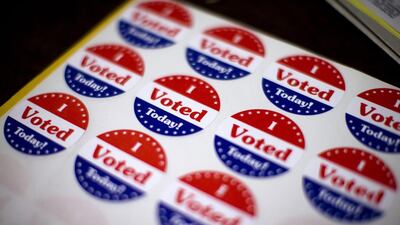With midterm elections only weeks away, I am once again being asked by Arab friends to explain my support for the Democrats. They maintain, not unfairly, that neither of the two major parties – Democrats or Republicans – have commendable records on the Arab world. So which way to vote? In response, I explain the roots of my political thinking, with lessons I learnt both from my mother and from my own life experiences.
One of the clearest examples of my mother’s thinking arrived in 1996 when she was interviewed on Good Morning America. They wanted to know why she, an 89-year-old Catholic woman, was voting for the Democrats. In her responses, she related how her life had shaped her political thinking.
My mother began by telling how when her Lebanese immigrant family arrived in Pennsylvania at the turn of the 20th century, it was the Democrats who welcomed them. They lived in the heart of coal country and most of their neighbours were immigrants from Europe who worked long, tough hours in the mines. It was the Democrats, she said, who fought for their rights. When the Great Depression hit, it was Franklin D Roosevelt’s New Deal that put people back to work.
Moving forward, my mother noted the role of the party in defending civil rights, social security, Medicare and programmes that addressed the needs of the underprivileged. In short, she grew up not only believing that government had a responsibility to lend a helping hand to those who needed it, but had seen, first hand, government fulfilling those responsibilities.
When I was in my rebellious teens, I became enamoured of Barry Goldwater’s Conscience of a Conservative. My mother would have none of it. One day as I was spouting off about the evils of government, she told me: “If it weren’t for social security survivor benefits [which I had been receiving since my father’s death when I was 15], you’d be working right now instead of being in school and if it weren’t for the New York State scholarship you’d won, we wouldn’t have been able to send you to college.” She concluded by saying “don’t deny to others what you take for yourself”.
The phase through which I had been going was typical stuff for teens: it was a kind of infantile narcissism. My mother told me to remember the responsibilities we have toward others. My rebellion was short-lived.
Like so many other immigrants, my family arrived in the US with nothing but dreams and a commitment to work hard. We succeeded, in many ways beyond our wildest dreams. But my mother’s point was that the success wasn’t ours alone. It was also due to a social contract that had provided support when we needed it most.
My own experiences have taught me the same lessons. From my earliest work in the Palestine Human Rights Campaign, through my involvement in Jesse Jackson’s 1984 and 1988 presidential campaigns, to my work fighting against discrimination against Arab Americans or more recently to our efforts to combat the post-9/11 anti-Arab, anti-Muslim backlash, our most dependable allies have always been the Democrats.
We haven’t won every battle. But I cannot imagine where my community would be today had it not been for the support we received from African Americans, Asian Americans, Latinos, church leaders, liberals and progressives. We worked together to support each other’s rights. Within these coalitions, we work to make change. Along the way, we’ve won new allies.
Politics, I have learnt is never perfect, and rarely is it black and white. It is, however, a matter of values – how, as my mother would have said it, we can do the most good for those with the greatest need.
Take the example of the debate over health care reform. No one can claim that Obamacare is perfect. It has problems that must be fixed, but it has been a blessing to many.
At a recent town meeting I helped lead in Pennsylvania, a middle aged immigrant grocer with a heart condition told us how he had never been able to get health insurance because he had a pre-existing condition. Thanks to Obamacare, he is now insured for the first time in his life.
I take this issue personally. My granddaughter, Hope, was born with Down syndrome.
Hope is getting remarkable support because the Democrat-controlled state where she lives provides services to special needs children. And because she was born after Obamacare was signed into law, Hope will never be denied health care because of a pre-existing condition.
Doing the most good for those who are the most in need, that’s what government should do. That was the lesson I learnt from my mother and my life, and I look at every election through that same value system.
Dr James Zogby is the president of the Arab American Institute
Twitter: @aaiusa


